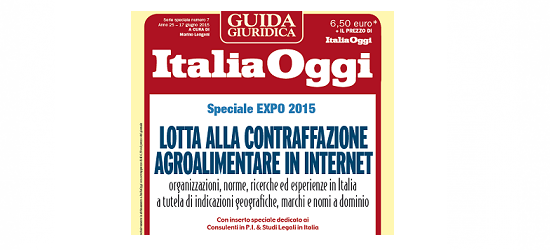
Angela Zampetti, Attorney at Law and trademarks and design Attorney
and Emidia Di Sabatino, Attorney at Law Luppi & Crugnola Srl, Modena, Bologna, Milan
Counterfeiting in the food industry occurs increasingly frequently via e-commerce, outside national boundaries in an area, the World Wide Web, which can be accessed by anyone anywhere.
The industry professionals, above all the monitoring consortia, are all trying to eradicate the phenomenon in order to protect the consumer and promote and nurture outstanding Italian products.
Counterfeiting designation not only misleads consumers but is also a form of unfair exploitation of the reputation of the entire food sector because the counterfeited products lack the qualitative characteristics of the original products.
There has been media coverage of recent cases of sales online, on websites and on e-commerce platforms of wine kits containing powders and grape concentrate under the false pretence of enabling the customer to produce at home in a few weeks famous Italian wines (Barolo, Chianti, Valpolicella etc.), even down to the fruit taste. The media have also exposed the case of counterfeit Prosecco in the United Kingdom and of a very recent Crimean Prosecco.
The wine kit phenomenon has become so bad that last August an international criminal gang was discovered, in which an Italian company was also implicated, for producing and marketing wine kits that illegally reproduced 24 Italian wines bearing the DOP and IGP labels.
Selling, advertising and marketing wine kits on the Web infringe exclusive ownership rights as the wines do not come from that geographical area and are not made in conformity to the corresponding regulations, mislead the consumer and constitute misappropriation of the fame of the geographical signs that harms the reputation of the legitimate industry professionals.
Also usurping, imitating or evoking actual means of presenting the product may constitute an improper use of designations of origin (DOP) and geographical indications (IGP).
The false Prosecco advertised and sold in the UK, like the Prosecco produced in the Crimea, was a wine that had nothing to do with the original in terms of the place of production and did not possess the prescribed characteristics.
In the case of the British Prosecco, the wine was even sold to the public on tap, a clear infringement of the requirement to bottle the wine.
The above cases also constitute a misleading use of an indication of the origin, nature and essential qualities of the product either because an imitative label has been affixed to indicate a geographic area or because the label displays a denomination that sounds like the original denomination or simply because the websites indicate the various protected denominations.
Signs and/or figures are often placed on the package and/or packaging of the products (for example the Coliseum, the Italian flag) that suggestively evoke the concept of “Italy”.
In view of the variety and sophistication of the abuses, the monitoring consortia should combat the giants of the market place through monitoring instruments and administrative procedures for reporting infringements to website managers so that the contents of the individual advertisement and also of subsequent advertisements of the same type that may appear are removed.
That is how the recent memorandum of understanding should be read regarding the protection and nurture of DOP and IGP wines on the e-Bay platform that uses the VeRO (Verified Rights Owner) programme and the “On-line anti-counterfeiting desk” should be interpreted that has been set up by the Ministry of Agricultural, Food and Forestry Policies in order to combat new food-product counterfeiting phenomena and enables protection consortia, professional associations and individual consumers to report instances of counterfeiting, also by filling in the anti-counterfeiting form that can be emailed directly.
Collaboration between the public and the private sector should permit better monitoring of infringements of DOP and IGP products.
